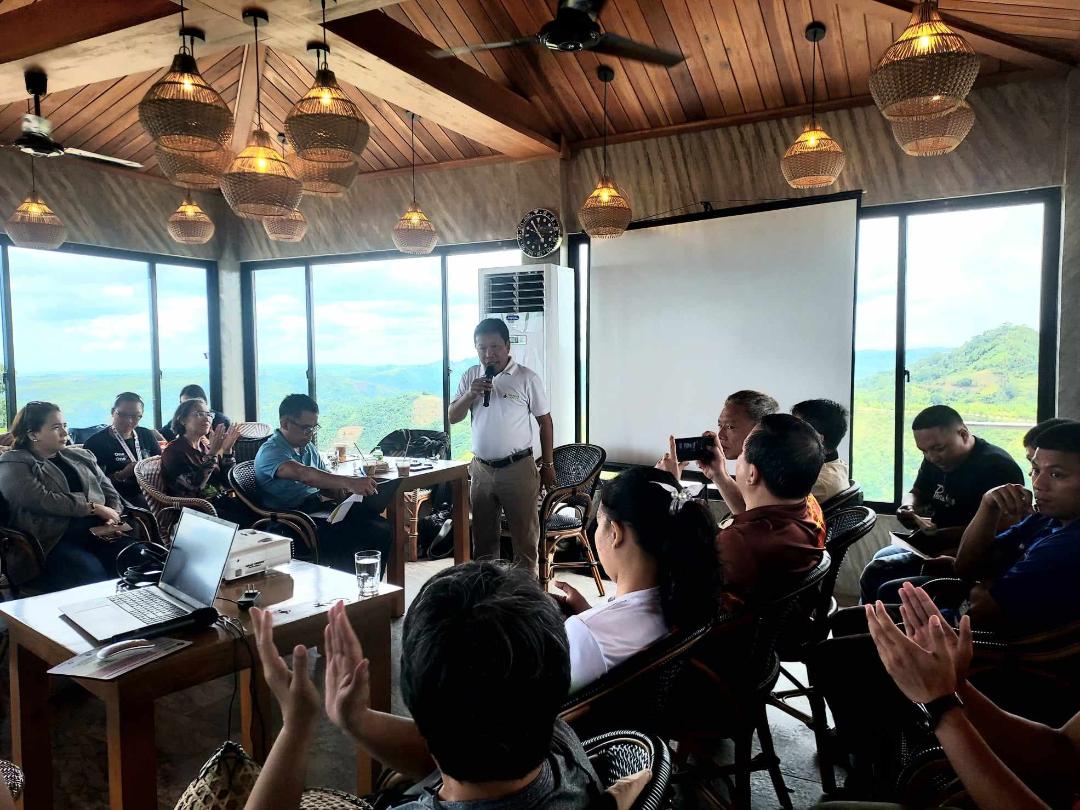CEBU CITY – The coffee industry development program in Tuburan town, Cebu is something that can be replicated nationwide as part of the country’s poverty reduction plan.
National Anti-Poverty Commission (NAPC) Secretary Lope Santos III said this after he attended the recent convergence of various government agencies in Tuburan.

TUBURAN, Cebu Mayor Aljun Diamante speaks during the recent quarterly convergence of government agencies in Tuburan. (Calvin D. Cordova)
“We want to document this and relay it to other local government units. Our mandate is to strengthen the local action poverty reduction plan based on the Magna Carta for the Poor and adequate food and agriculture is one of our major priorities to have adequate food for everybody,” Santos said.
The booming coffee industry in Tuburan is the brainchild of Mayor Aljun Diamante who pushed his constituents to engage in coffee farming as their main source of livelihood. The town now has about 2,000 coffee farmers.
“If Tuburan succeeded because of the convergence of the government agencies in cooperation with the local government units (LGUs), then it can also be replicated by other LGUs,” said Santos.
Santos said that based on his observation during the convergence, the coffee industry in Tuburan offers a lot of potential.
“We saw that the initial program may create more programs. The value chain of the coffee industry will develop into a tourism industry, may upgrade to another level, and may lead to an upland ecosystem in the integrated development program not just coffee but also other crops,” said Santos.
Diamante said that the convergence started in 2015 as part of the Accelerated and Sustainable Anti-Poverty program of the National Economic Development Authority (NEDA).
Officials from various government agencies such as the NEDA, Department of Environment and Natural Resources, Department of Trade and Industry, Department of Tourism, Department of Science and Technology, Department of Public Works and Highways, and National Irrigation Authority, among others, would meet for the quarterly convergence.
“The purpose of the convergence is to help the poor, the poorest of the poor,” said Diamante.
When the convergence was created, Diamante recommended the creation of a program for coffee planters in Tuburan.
“We recommended our coffee planters and in 2011, we got 500 hectares from DENR. But we did not let our farmers plant ordinary trees to eradicate ‘kaingin’ (cutting and burning of trees for charcoal). But we didn’t stop kaingin without giving our farmers an alternative and that alternative is coffee farming,” said Diamante.
Diamante said he was able to acquire an effective technology for coffee production that prompted him to convert an 80-hectare property into a coffee farm.
“Using my personal resources, I hired 65 people to run the farm. It was not easy to sustain the farm because I have to shell out P800,000 a month for the salary of the workers,” said Diamante.
Coffee trees would only start bearing cherries about two to three years after they were planted.
With the help of DENR, more locals got into coffee farming.
Diamante said that 29 of the 54 barangays in Tuburan are now into coffee farming.
He said the convergence of government agencies was a key in the development of the town’s coffee industry.
Diamante is hoping that other LGUs in Cebu will also venture into coffee farming.
Cebu has 44 towns and six component cities.
“If every town will have one hectare of coffee plantation, Cebu will have 44,000 hectares of coffee farms. In one hectare, at least 1,500 trees can be planted. Each tree would produce 10 kilos of cherries so we will have 666 million kilos a year,” said Diamante.
Cherries can be sold for P15 to P20 per kilo which means Cebu will have a P13.2-billion coffee industry, Diamante said.
Diamante said part of the goal to further develop the coffee industry in Tuburan is to encourage students to take up agriculture.
The Tuburan mayor also aspires to make Cebu as the coffee capital of the country. “In coffee, there is life and in coffee, there is money,” said Diamante.